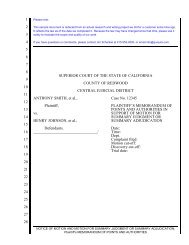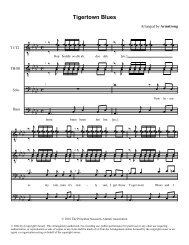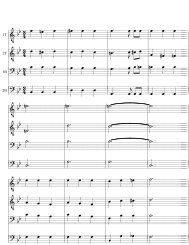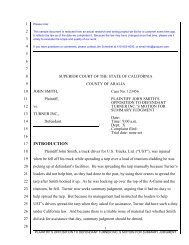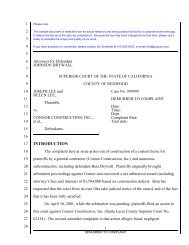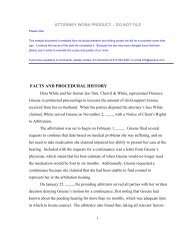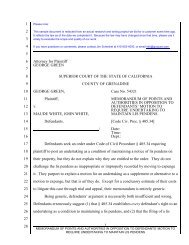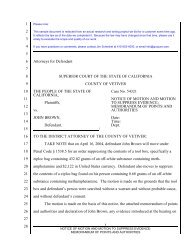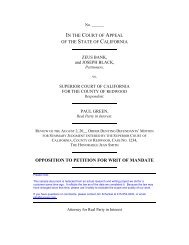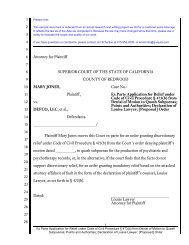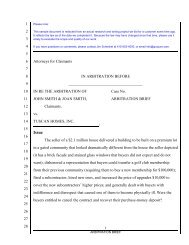Opposition to Demurrer - Quo Jure Corporation
Opposition to Demurrer - Quo Jure Corporation
Opposition to Demurrer - Quo Jure Corporation
You also want an ePaper? Increase the reach of your titles
YUMPU automatically turns print PDFs into web optimized ePapers that Google loves.
1<br />
2<br />
3<br />
4<br />
5<br />
6<br />
7<br />
8<br />
9<br />
10<br />
11<br />
12<br />
13<br />
14<br />
15<br />
16<br />
17<br />
18<br />
19<br />
20<br />
21<br />
22<br />
23<br />
24<br />
25<br />
26<br />
27<br />
28<br />
2. Plaintiffs have stated a proper claim for willful misconduct.<br />
Willful misconduct is a recognized cause of action in California, and it is distinct<br />
from a negligence cause of action. In New v. Consol. Rock Products Co. (1985) 171<br />
Cal.App.3d 681, 688-690, the court explained the distinction between claims for mere<br />
negligence and those involving willful misconduct:<br />
“Three essential elements must be present <strong>to</strong> raise a negligent act <strong>to</strong> the level<br />
of wilful misconduct: (1) actual or constructive knowledge of the peril <strong>to</strong> be<br />
apprehended, (2) actual or constructive knowledge that injury is a probable,<br />
as opposed <strong>to</strong> a possible, result of the danger, and (3) conscious failure <strong>to</strong> act<br />
<strong>to</strong> avoid the peril.”<br />
Id. at 689-690 (citing Morgan v. Southern Pacific Trans. Co. (1974) 37<br />
Cal.App.3d 1006, 1012; citations omitted).<br />
The distinction between negligence and willful misconduct is the defendant’s state of<br />
mind. “Willful misconduct means something different from and more than negligence,<br />
however gross.” Perez v. Southern Transportation Co. (1990) 218 Cal.App.3d 462, 470-<br />
471. Willful misconduct is a cause of action an elderly patient may assert against a<br />
skilled nursing facility. “Possible causes of action that might be incorporated in a<br />
complaint against a skilled nursing facility include: willful misconduct in violation of a<br />
statu<strong>to</strong>ry or regula<strong>to</strong>ry duty.” CALIFORNIA ELDER LAW LITIGATION: AN ADVOCATE’S<br />
GUIDE (CEB 1998) §§ 12:42-12:43. This is precisely what plaintiff’s first claim for<br />
willful misconduct alleges here. SAC, 34-40.<br />
Defendant Competent Care protests that, “[i]n the context of healthcare services,<br />
wilfulness is a legal reference <strong>to</strong> the degree of intent involved in the commission of an<br />
underlying <strong>to</strong>rt, not a distinct cause of action in itself.” Competent’s Memorandum at<br />
4:13-14. But if one ignores the title of this claim, the facts pleaded support a cause of<br />
action for negligence and punitive damages based on malice and oppression as defined by<br />
Civil Code § 3294. Thus even if the Court finds plaintiffs’ claim for willful misconduct<br />
3<br />
PLAINTIFFS’ MEMORANDUM OF POINTS AND AUTHORITIES IN OPPOSITION TO DEFENDANTS’<br />
DEMURRERS TO SECOND AMENDED COMPLAINT



